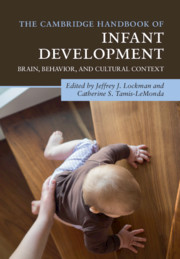Book contents
- The Cambridge Handbook of Infant Development
- The Cambridge Handbook of Infant Development
- Copyright page
- Dedication
- Contents
- Illustrations
- Contributors
- Preface
- Part I Foundations
- Part II Perceptual Development
- Part III Cognitive Development
- 12 Infant Memory
- 13 Infant Physical Knowledge
- 14 Infant Categorization
- 15 Early Knowledge About Space and Quantity
- 16 Infant Learning in the Digital Age
- Part IV Action
- Part V Language
- Part VI Emotional and Social Development
- Index
- References
14 - Infant Categorization
from Part III - Cognitive Development
Published online by Cambridge University Press: 26 September 2020
- The Cambridge Handbook of Infant Development
- The Cambridge Handbook of Infant Development
- Copyright page
- Dedication
- Contents
- Illustrations
- Contributors
- Preface
- Part I Foundations
- Part II Perceptual Development
- Part III Cognitive Development
- 12 Infant Memory
- 13 Infant Physical Knowledge
- 14 Infant Categorization
- 15 Early Knowledge About Space and Quantity
- 16 Infant Learning in the Digital Age
- Part IV Action
- Part V Language
- Part VI Emotional and Social Development
- Index
- References
Summary
This chapter is about categorization in infancy. In general, categories refer to groups of objects in the world, and concepts refers to our mental representations of those categories. Whereas categories can refer to groups of objects based on any kind of similarity (e.g., shape, such as round things, function, such as things you throw), concepts often are thought to include information that goes beyond the perceptual, for example understanding that dogs and birds are both living things, and that airplanes and birds are different things despite similarity in shape and function. Categories and concepts have been described as “the glue that holds our mental world together” (Murphy, 2002, p. 1) and that without them “mental life would be chaotic” (E. E. Smith & Medin, 1981, p. 1). Therefore, categories, and the processes we use to form them, are central to cognition.
Keywords
- Type
- Chapter
- Information
- The Cambridge Handbook of Infant DevelopmentBrain, Behavior, and Cultural Context, pp. 381 - 409Publisher: Cambridge University PressPrint publication year: 2020

